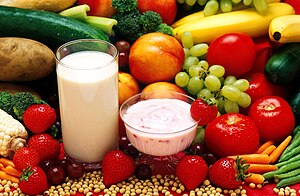 Image via WikipediaI have come across an article about tofu as being the cause of a lady's health woes, and digging in deeper, it was found that she over-consumed the food, which is thought as a health food in the first place.
Image via WikipediaI have come across an article about tofu as being the cause of a lady's health woes, and digging in deeper, it was found that she over-consumed the food, which is thought as a health food in the first place.Is this article on the same storyline?
-----
Overview
Soybeans, a mainstay of the Asian diet for centuries, have become increasingly popular in the West as a low-fat source of protein and oil. Soybeans can be used to make many healthy, inexpensive and versatile food products, including tofu, miso and soymilk. Soy products provide "complete protein," meaning they contain all the amino acids essential to human nutrition. Despite the high nutritional value of soy, scientists cannot rule out the possibility of side effects of consuming soy products. Therefore, you should not take soy products without first talking to your doctor.
Breast Cancer Risk
Scientists are not sure if breast cancer risk is influenced by consuming phytoestrogens from soy products. Some animal studies with human breast cancer cells have found that soy phytoestrogens may act as estrogens in the human body and possibly raise the risk of breast cancer, according to Barbour S. Warren and Carol Devine, Ph.D., R.D., of the Sprecher Institute at Cornell University. Long, uninterrupted exposure to estrogen is an established risk factor for breast cancer. Estrogen facilitates the growth of milk ducts in the breast, where most breast cancers arise. Soy phytoestrogens, specifically isoflavones, are similar to human estrogen in structure. This allows them to bind to the same chemical receptors as endogenous estrogen and mimic its action. Women should consume soy products with care because they may increase estrogenic activity in the body.
Thyroid Disease
Soy isoflavones are potent inhibitors of the enzymes thyroid peroxidase and 5'-deiodinase, which are responsible for the oxidation and organification of iodide to iodine. Iodine is a trace element essential for the biosynthesis of thyroid hormones. Inhibition of these enzymes by soy isoflavones lowers circulating thyroid hormones, which results in an increased serum TSH. TSH is the thyroid-stimulating hormone that potentiates the pathogenesis of goiter, the enlargement of the thyroid gland. The effects of soy isoflavones on the thyroid function are more pronounced when you consume an iodine-insufficient diet for a long time. Adding iodine to the diet, however, offsets this effect.
Soy Allergy
Food allergies are immunologically based abnormal responses to a particular food or food component. Symptoms of soy allergy can range in severity from harmless skin reactions to gastrointestinal disturbances to respiratory distress to cardiovascular problems. Researchers have identified at least 15 soy proteins that are responsible for allergic reactions; however, the mechanism of action has remained unclear. The protein 2S globulin has been recognized as the most powerful one. Soy allergy is more common in children than adults. If you have allergies to soy, you should avoid all soy products such as tofu, miso, soymilk, soy flour, soy yogurt and tempeh.
Gout
Soybeans are also rich in purines, natural substances found in all body tissues and in some foods. Consuming large amounts of soy products, including tofu, can raise your uric acid level and make the gout worse. Uric acid, a purine degradation product, deposits in joint spaces as small crystals and causes intense pain, swelling and inflammation.
Taken from livestrong.com; source article is below:
Health Issues Related to Soy Products & Tofu

I strongly believe that hypothyroidism can be overlooked but it is easy to treat with natural thyroid supplements .
ReplyDeleteHi Anita,
ReplyDeleteAgree with what you say. But take note that cause by over-consumption (I would always emphasize that) is the key, and this has to happen over a long period of time.
Iodine deficiency isn't something new as well, so we have those supplements in our common consumables, such as iodized salt, etc.
Again, thanks for your view, very well valued. Stay healthy. Live happily!